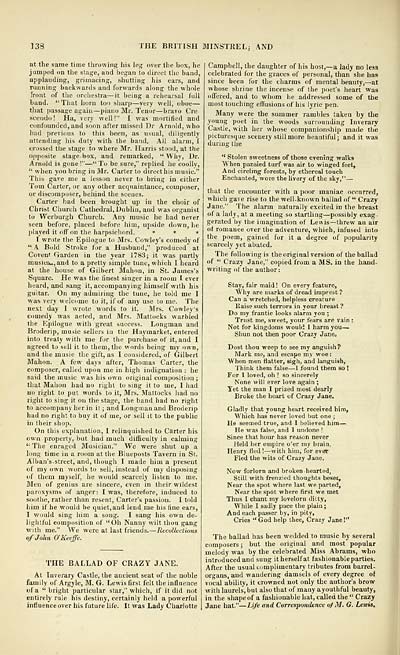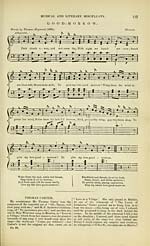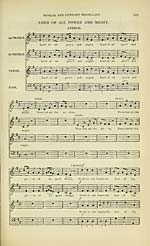Glen Collection of printed music > Printed music > British minstrel, and musical and literary miscellany
(830) Page 138
Download files
Complete book:
Individual page:
Thumbnail gallery: Grid view | List view

138
THE BRITISH MINSTREL: AND
at the same time throwing his leg over the Ijnx, he
jumped on tlie stasje, and began to direct tlie band,
applauding-, grimacing, shutting his ears, and
running backwards and forwards along the whole
front of the orchestra — it being a rehearsal full
band. "That horn too sliarp — very well, oboe —
that passage again — jiiano Mr. Tenor — bravo C're
scendo! Ha, very well!" I was mortified and
confounded, and soon after missed Dr Arnold, who
had previous to this been, as usual, diligently
attending his duty with the band. All alarm, I
crossed the stage to where Mr. Harris stood, at the
opposite stage-box, and remarked, " Wliy, Dr.
Arnold is gone!" — "To be sure," replied he eoollv,
" when you bring in Mr. Carter to direct his music."
This gave me a lesson never to bring in either
Tom Carter, or any other acquaintance, composer,
or discomposer, behind the scenes.
Carter liad been brought up in the choir of
Christ Church Cathedral, Dublin, and was organist
to Werburgh Church. Any music he bad never
seen before, placed before him, upside down, he
played it off on the harpsichord. « * «
I wrote the Epilogue to Mrs. Cowley's comedy of
" A Bold Stroke for a Husband," produced at
Coven! Garden in the year 1783; it was partly
musicai,aud to a pretty simple tune, which I heard
at the bouse of Gilbert Mahon, in St. James's
Square. He was the finest singer in a room I ever
heard, and sang it, accompanying himself with bis
guitar. On my admiring the tune, be told me I
was very welcome to it, if of any use to me. The
next day I wrote words to it. Mrs. Cowley's
comedy was acted, and Mrs. JIatlocks warbled
the Epilogue with great success. Longman and
Broderip, music sellers in tlie Haymarket, entered
into treaty with me for the purchase of it, and I
agreed to sell it to them, the words being my own,
and the music the gift, as I considered, of Gilbert
Mahon. A few days after, Thomas Carter, the
composer, called upon me in high indignation : he
said the music was his own original composition ;
that Mahon had no right to sing it to me, I had
no right to put words to it, Mrs. Mattocks had no
right to sing it on the stage, the band bad no right
to accompany her in it ; and Longman and Broderip
had no right to buy it of me, or sell it to the public
in their shop.
On this explanation, I relinquished to Carter bis
own property, but had much difficulty in calming
" The enraged Musician." We were shut up a
long time in a room at the Blueposts Tavern in St.
Alban's-street, and, though I made him a present
of my own words to sell, instead of my disposing
of them myself, he would scarcely listen to me.
Men of genius are sincere, even in their wildest
paroxysms of anger: I was, therefore, induced to
soothe, rather than resent, Carter's passion. I told
him if he would be quiet, and lend me his line ears,
I would sing him a song. I sang his own de-
lightful composition of "Oh Nanny wilt thou gang
with me." We were at last friends. — Recollections
of John O'Keeffe.
THE BALLAD OF CRAZY JANE.
At Inverary Castle, the ancient seat of the noble
family of Argyle, BI. G. Lewis first felt the influence
of a " bright particular star," which, if it did not
entirely rule his destiny, certainly held a powerful
influence over his future life. It was Lady Charlotte
Campbell, the daughter of his host, — a lady no less
celebrated for the graces of personal, than sbe has
since been for the charms of mental beauty, — at
whose shrine the incense of the poet's heart was
offered, and to whom he addressed some of the
most touching eOusions of his lyric pen.
Many were the summer rambles taken by the
young poet in the woods surrounding Inverary
Castle, with her whose companionship made the
picturesque scenery still more beautiful ; and it was
during the
** Stolen sweetness of those evening walks
"When pansied turf was air to winged feet,
And circling forests, by ethereal touch
Enchanted, wore the livery of the sky," —
that the encounter with a poor maniac occurred,
which gave rise to the well-known ballad of " Crazy
Jane." The alarm naturally excited in the breast
ol a lady, at a meeting so startling— possibly exag-
gerated by the imagination of Lewis— threw an air
of romance over the adventure, which, infused into
the poem, gained for it a degree of popularity
scarcely yet abated.
The following is the original version of the ballad
of " Crazy Jane," copied from a MS. in the hand-
writing of the author:
Stay, fair maid ! On every feature,
Why are marks of dread imprest ?
Can a wretched, helpless creature
Kaise such terrors in your breast ?
Do my frantic looks alarm you ;
Trust me, sweet, your fears are vain :
Not for kingdoms would I harm you —
Shun not then poor Crazy Jane.
Dost thou weep to see my anguish ?
Mark me, and escape my woe :
When men flatter, sigh, and languish,
Think them false — 1 found them so I
For 1 loved, oh ! so sincerely
None will ever love again ;
Tet the man I prized most dearly
Broke the heart of Crazy Jane.
Gladly that young heart received him,
Which has never loved but one ;
He seemed true, and I believed him —
He was false, and I undone !
Since that hour has reason never
Held her empire o'er my brain.
Henry fled ! — with him, for eves:
Fled the wits of Crazy Jane.
Now forlorn and broken-hearted.
Still with frenzied thoughts besec.
Near the spot where last we parted,
Near the spot where first we met
Thus I chant my lovelorn ditty,
While I sadly pace the plain ;
And each passer by, in pity.
Cries " God help thee. Crazy Jane 1"
The ballad has been wedded to music by several
composers ; but the original and most popular
melody was by the celebrated Miss Abrams, who
introduced and sung itherselfat fashionable parties.
After the usual complimentary tributes from barrel-
organs, and wandering damsels of every degree of
vocal ability, it crowned not only the author's browr
with laurels, but also that of many ayouthful beauty,
in the shapeof a fashionable hat, called the " Crazy
Jane hat." — Life and Correspondence o) M. G. Lewis,
THE BRITISH MINSTREL: AND
at the same time throwing his leg over the Ijnx, he
jumped on tlie stasje, and began to direct tlie band,
applauding-, grimacing, shutting his ears, and
running backwards and forwards along the whole
front of the orchestra — it being a rehearsal full
band. "That horn too sliarp — very well, oboe —
that passage again — jiiano Mr. Tenor — bravo C're
scendo! Ha, very well!" I was mortified and
confounded, and soon after missed Dr Arnold, who
had previous to this been, as usual, diligently
attending his duty with the band. All alarm, I
crossed the stage to where Mr. Harris stood, at the
opposite stage-box, and remarked, " Wliy, Dr.
Arnold is gone!" — "To be sure," replied he eoollv,
" when you bring in Mr. Carter to direct his music."
This gave me a lesson never to bring in either
Tom Carter, or any other acquaintance, composer,
or discomposer, behind the scenes.
Carter liad been brought up in the choir of
Christ Church Cathedral, Dublin, and was organist
to Werburgh Church. Any music he bad never
seen before, placed before him, upside down, he
played it off on the harpsichord. « * «
I wrote the Epilogue to Mrs. Cowley's comedy of
" A Bold Stroke for a Husband," produced at
Coven! Garden in the year 1783; it was partly
musicai,aud to a pretty simple tune, which I heard
at the bouse of Gilbert Mahon, in St. James's
Square. He was the finest singer in a room I ever
heard, and sang it, accompanying himself with bis
guitar. On my admiring the tune, be told me I
was very welcome to it, if of any use to me. The
next day I wrote words to it. Mrs. Cowley's
comedy was acted, and Mrs. JIatlocks warbled
the Epilogue with great success. Longman and
Broderip, music sellers in tlie Haymarket, entered
into treaty with me for the purchase of it, and I
agreed to sell it to them, the words being my own,
and the music the gift, as I considered, of Gilbert
Mahon. A few days after, Thomas Carter, the
composer, called upon me in high indignation : he
said the music was his own original composition ;
that Mahon had no right to sing it to me, I had
no right to put words to it, Mrs. Mattocks had no
right to sing it on the stage, the band bad no right
to accompany her in it ; and Longman and Broderip
had no right to buy it of me, or sell it to the public
in their shop.
On this explanation, I relinquished to Carter bis
own property, but had much difficulty in calming
" The enraged Musician." We were shut up a
long time in a room at the Blueposts Tavern in St.
Alban's-street, and, though I made him a present
of my own words to sell, instead of my disposing
of them myself, he would scarcely listen to me.
Men of genius are sincere, even in their wildest
paroxysms of anger: I was, therefore, induced to
soothe, rather than resent, Carter's passion. I told
him if he would be quiet, and lend me his line ears,
I would sing him a song. I sang his own de-
lightful composition of "Oh Nanny wilt thou gang
with me." We were at last friends. — Recollections
of John O'Keeffe.
THE BALLAD OF CRAZY JANE.
At Inverary Castle, the ancient seat of the noble
family of Argyle, BI. G. Lewis first felt the influence
of a " bright particular star," which, if it did not
entirely rule his destiny, certainly held a powerful
influence over his future life. It was Lady Charlotte
Campbell, the daughter of his host, — a lady no less
celebrated for the graces of personal, than sbe has
since been for the charms of mental beauty, — at
whose shrine the incense of the poet's heart was
offered, and to whom he addressed some of the
most touching eOusions of his lyric pen.
Many were the summer rambles taken by the
young poet in the woods surrounding Inverary
Castle, with her whose companionship made the
picturesque scenery still more beautiful ; and it was
during the
** Stolen sweetness of those evening walks
"When pansied turf was air to winged feet,
And circling forests, by ethereal touch
Enchanted, wore the livery of the sky," —
that the encounter with a poor maniac occurred,
which gave rise to the well-known ballad of " Crazy
Jane." The alarm naturally excited in the breast
ol a lady, at a meeting so startling— possibly exag-
gerated by the imagination of Lewis— threw an air
of romance over the adventure, which, infused into
the poem, gained for it a degree of popularity
scarcely yet abated.
The following is the original version of the ballad
of " Crazy Jane," copied from a MS. in the hand-
writing of the author:
Stay, fair maid ! On every feature,
Why are marks of dread imprest ?
Can a wretched, helpless creature
Kaise such terrors in your breast ?
Do my frantic looks alarm you ;
Trust me, sweet, your fears are vain :
Not for kingdoms would I harm you —
Shun not then poor Crazy Jane.
Dost thou weep to see my anguish ?
Mark me, and escape my woe :
When men flatter, sigh, and languish,
Think them false — 1 found them so I
For 1 loved, oh ! so sincerely
None will ever love again ;
Tet the man I prized most dearly
Broke the heart of Crazy Jane.
Gladly that young heart received him,
Which has never loved but one ;
He seemed true, and I believed him —
He was false, and I undone !
Since that hour has reason never
Held her empire o'er my brain.
Henry fled ! — with him, for eves:
Fled the wits of Crazy Jane.
Now forlorn and broken-hearted.
Still with frenzied thoughts besec.
Near the spot where last we parted,
Near the spot where first we met
Thus I chant my lovelorn ditty,
While I sadly pace the plain ;
And each passer by, in pity.
Cries " God help thee. Crazy Jane 1"
The ballad has been wedded to music by several
composers ; but the original and most popular
melody was by the celebrated Miss Abrams, who
introduced and sung itherselfat fashionable parties.
After the usual complimentary tributes from barrel-
organs, and wandering damsels of every degree of
vocal ability, it crowned not only the author's browr
with laurels, but also that of many ayouthful beauty,
in the shapeof a fashionable hat, called the " Crazy
Jane hat." — Life and Correspondence o) M. G. Lewis,
Set display mode to: Large image | Transcription
Images and transcriptions on this page, including medium image downloads, may be used under the Creative Commons Attribution 4.0 International Licence unless otherwise stated. ![]()
| Special collections of printed music > Glen Collection of printed music > Printed music > British minstrel, and musical and literary miscellany > (830) Page 138 |
|---|
| Permanent URL | https://digital.nls.uk/91444905 |
|---|
| Description | Scottish songs and music of the 18th and early 19th centuries, including music for the Highland bagpipe. These are selected items from the collection of John Glen (1833 to 1904). Also includes a few manuscripts, some treatises, and other books on the subject. |
|---|
| Description | The Glen Collection and the Inglis Collection represent mainly 18th and 19th century Scottish music, including Scottish songs. The collections of Berlioz and Verdi collected by bibliographer Cecil Hopkinson contain contemporary and later editions of the works of the two composers Berlioz and Verdi. |
|---|

